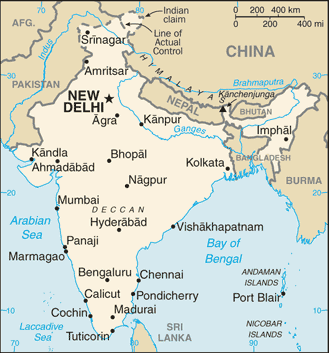Mumbai records most leptospirosis cases since 2009
The city of Mumbai, India has recorded 198 cases of the bacterial disease, leptospirosis so far in 2013, making it the heaviest year for the spirochete in the city since 2009, according to a Mumbai Mirror report today.

Image/CIA
Of the 198, three people have died as a result of the infection.
The report notes that in 2010, 18 people had succumbed to the disease (135 cases reported), while six people died of leptospirosis the following year (141 cases reported). Last year saw two deaths due to the disease, while 151 cases had been reported.
Leptospirosis is a bacterial zoonotic disease caused by the corkscrew shaped organism, Leptospira. It goes by several other names depending on the locale; mud fever, swamp fever, sugar cane and Fort Bragg fever, among others. It is a disease of both humans and animals.
The rat is the main host to Leptospira. However other animals such as cattle, pigs, horses, dogs, rodents, and wild animals.
People become infected by direct or indirect contact with the urine of these animals. Contact with urine-contaminated water is extremely important. Contaminated food and soil containing animal urine are other potential sources of infection.
The bacterium enters through contact with skin. Especially through cuts or breaks in the skin and through mucous membranes like the eyes.
Found worldwide, it was long considered an occupational disease (miners, farming, vets, and sugarcane harvesting and sewer workers), it is increasingly associated with recreational water sports and camping.
Symptoms of leptospirosis, if present, appear in up to 4 weeks after exposure. Sometimes the person will show no symptoms or mild flu-like symptoms.
According to the CDC, Leptospirosis may occur in two phases; after the first phase, with fever, chills, headache, muscle aches, vomiting, or diarrhea, the patient may recover for a time but become ill again. If a second phase occurs, it is more severe; the person may have kidney or liver failure (jaundice) or meningitis. This phase is also called Weil’s disease.
Leptospirosis is confirmed by laboratory testing of a blood or urine sample.
The infection can be treated with antibiotics (penicillin and doxycycline), especially if started early in the disease. For very ill patients, intensive care support and IV antibiotic may be necessary.
For more infectious disease news and information, visit and “like” the Infectious Disease News Facebook page














